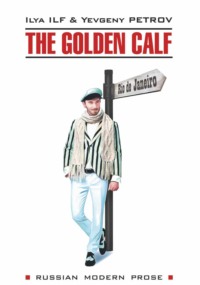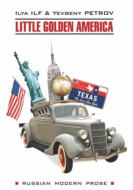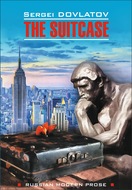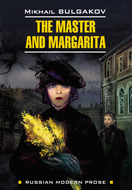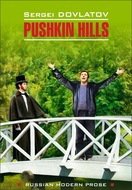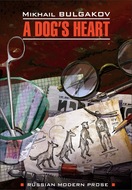Kitabı oku: «Золотой теленок / The Golden Calf»
© КАРО, 2021
Все права защищены
“Look both ways before crossing the street.”
– Traffic regulation
Part 1. The Crew of the Antelope
Chapter 1. How Panikovsky broke the pact
You have to be nice to pedestrians. Pedestrians comprise the greater part of humanity.
Moreover, its better part. Pedestrians created the world. They built cities, erected tall buildings, laid out sewers and waterlines, paved the streets and lit them with electricity. They spread civilization throughout the world, invented the printing press and gunpowder, flung bridges across rivers, deciphered Egyptian hieroglyphs, introduced the safety razor, abolished the slave trade, and established that no less than 114 tasty, nutritious dishes can be made from soybeans.
And just when everything was ready, when our native planet had become relatively comfortable, the motorists appeared.
It should be noted that the automobile was also invented by pedestrians. But, somehow, the motorists quickly forgot about this. They started running over the mild-mannered and intelligent pedestrians. The streets – laid out by pedestrians – were taken over by the motorists.
The roads became twice as wide, while the sidewalks shrunk to the size of a postage stamp. The frightened pedestrians were pushed up against the walls of the buildings.
In a big city, pedestrians live like martyrs. They’ve been forced into a kind of traffic ghetto. They are only allowed to cross the streets at the intersections, that is, exactly where the traffic is heaviest – where the thread by which a pedestrian’s life hangs is most easily snapped.
In our expansive country, the common automobile – intended by the pedestrians to peacefully transport people and things – has assumed the sinister role of a fratricidal weapon. It puts entire cohorts of union members and their loved ones out of commission.
And if on occasion a pedestrian manages to dart out from under a silver grille, he is fined by the police for violating the traffic laws.
In general, the pedestrians’ standing is not what it used to be. They, who gave the world such outstanding figures as Horace, Boyle, Mariotte, Lobachevsky, Gutenberg, and Anatole France, have been forced to jump through ridiculous hoops just to remind others of their existence. Lord, oh Lord (who, frankly, doesn’t exist), how low you (who don’t really exist) have let the pedestrian stoop! Here he is, walking along a Siberian road from Vladivostok to Moscow, carrying a banner that reads IMPROVE THE LIVING CONDITIONS OF THE TEXTILE WORKERS in one hand, and with an extra pair of Uncle Vanya sandals and a lidless tin kettle dangling from a stick that he’s slung over his shoulder.
This is a Soviet hiker who left Vladivostok as a young man and who, upon reaching the outskirts of Moscow in his old age, will be run over and killed by a heavy truck. And nobody will even manage to get the license plate number.
Here’s another one, the last of the Mohicans of European foot traffic. He is pushing a barrel around the world. He would have been more than happy to walk just like that, without the barrel, but then nobody would notice that he is a long-distance hiker, and the press would ignore him. And so all his life he is forced to push the damn thing, which, to add insult to injury, has a large yellow advertisement extolling the unparalleled qualities of Motorist’s Dream engine oil.
This is how far the pedestrian has fallen.
Only in small Russian towns is the pedestrian still loved and respected. In those towns, he still rules, wandering carelessly in the middle of the street and crossing it in the most intricate manner in whatever direction he chooses.
A man wearing a white-topped captain’s cap, the kind favored by administrators of summer amusement parks and MCs, undoubtedly belonged to this greater and better part of humanity. He traveled the streets of the town of Arbatov on foot, looking around with somewhat critical curiosity. He carried a small doctor’s bag in his hand. Apparently the town made no particular impression on the pedestrian in the artsy cap.
He saw a dozen or so blue, yellow, and pinkish white church towers and noticed the peeling gold of the domes. A flag crackled above a government building. Near the white gate tower of the provincial citadel, two severe-looking old ladies conversed in French, complaining about the Soviet regime and reminiscing about their beloved daughters. Cold air and a sour wine-like smell wafted from the church basement. Apparently, it was used to store potatoes.
“Church of the Savior on Spilled Potatoes,” muttered the pedestrian.
He walked under the plywood arch with the freshly painted banner, WELCOME TO THE 5TH DISTRICT CONFERENCE OF WOMEN AND GIRLS, and found himself at the beginning of a long tree-lined alley named Boulevard of Prodigies.
“No,” he said with chagrin, “this is no Rio de Janeiro, this is much worse.”
Almost all the benches on the Boulevard of Prodigies were taken up by young women sitting alone with open books in their hands. Dappled shade fell across the pages of the books, the bare elbows, and the cute bangs. When the stranger stepped into the cool alley there was a noticeable stir on the benches. The girls hid their faces behind volumes by Gladkov, Eliza Orzeszkowa, and Seyfullina and eyed the visitor with temerity. He paraded past the excited book lovers and emerged from the alley at his destination, the city hall.
At that moment, a horse cab appeared from around the corner. A man in a long tunic briskly walked next to it, holding on to the dusty, beat-up fender and waving a bulging portfolio embossed with the word “Musique.” He was heatedly arguing with the passenger. The latter, a middle-aged man with a pendulous banana-shaped nose, held a suitcase between his legs and from time to time shook a finger in his interlocutor’s face in vehement disagreement. In the heat of the argument his engineer’s cap, sporting a band of plush green upholstery fabric, slid to one side. The adversaries uttered the word “salary” loudly and often.
Soon other words became audible as well.
“You will answer for this, Comrade Talmudovsky!” shouted the Tunic, pushing the engineer’s hand away from his face.
“And I am telling you that no decent professional would come to work for you on such terms,” replied Talmudovsky, trying to return his finger to its original position.
“Are you talking about the salary again? I’m going to have to launch a complaint about your excessive greed.”
“I don’t give a damn about the salary! I’d work for free!” yelled the engineer, angrily tracing all kinds of curves in the air with his finger. “I can even retire if I want to. Don’t treat people like serfs! You see ‘Liberty, equality, brotherhood’ everywhere now, and yet I am expected to work in this rat hole.”
At this point, Talmudovsky quickly opened his hand and started counting on his fingers:
“The apartment is a pigsty, there’s no theater, the salary… Driver! To the train station!”
“Whoa!” shrieked the Tunic, rushing ahead and grabbing the horse by the bridle. “As the secretary of the Engineers and Technicians local, I must… Kondrat Ivanovich, the plant will be left without engineers… Be reasonable… We won’t let you get away with this, Engineer Talmudovsky… I have the minutes here with me…”
And then the secretary of the local planted his feet firmly on the ground and started undoing the straps of his “Musique.”
This lapse decided the argument. Seeing that the path was clear, Talmudovsky rose to his feet and yelled at the top of his lungs:
“To the station!”
“Wait, wait…” meekly protested the secretary, rushing after the carriage. “You are a deserter from the labor front!”
Sheets of thin paper marked “discussed-resolved” flew out of the portfolio.
The stranger, who had been closely watching the incident, lingered for a moment on the empty square, and then said with conviction:
“No, this is definitely not Rio de Janeiro.”
A minute later he was knocking on the door of the city council chairman.
“Who do you want to see?” asked the receptionist who was sitting at the desk by the door. “What do you need to see the chairman for? What’s your business?”
Apparently the visitor was intimately familiar with the principles of handling receptionists at various governmental, non-governmental, and municipal organizations. He didn’t bother to claim that he had urgent official business.
“Private matters,” he said dryly and, without looking back at the receptionist, stuck his head in the door. “May I come in?”
Without waiting for an answer, he approached the chairman’s desk.
“Good morning, do you recognize me?”
The chairman, a dark-eyed man with a large head, wearing a navy blue jacket and matching pants that were tucked into tall boots with high angled heels, glanced at the visitor rather distractedly and said he did not recognize him.
“You don’t? For your information, many people think I look remarkably like my father.”
“I look like my father, too,” said the chairman impatiently. “What do you want, Comrade?”
“What matters is who the father was,” said the visitor sadly. “I am the son of Lieutenant Schmidt.”
The chairman felt foolish and started rising from his seat. He instantly recalled the famous image of the pale faced revolutionary lieutenant in his black cape with bronze clasps in the shape of lion’s heads. While he was pulling his thoughts together to ask the son of the Black Sea hero an appropriate question, the visitor examined the office furnishings with the eye of a discriminating buyer.
Back in tsarist times, all government offices were furnished in a particular style. A special breed of office furniture was developed: flat storage cabinets rising to the ceiling, wooden benches with polished seats three inches thick, desks on monumental legs, and oak barriers separating the office from the turmoil of the world outside. During the revolution, this type of furniture almost disappeared, and the secret of making it was lost. People forgot how to furnish government offices properly, and official spaces started filling up with objects that until then were thought to belong exclusively in private apartments. Among these were soft lawyer’s couches with springs and tiny glass shelves for the seven porcelain elephants that supposedly bring luck, as well as china cabinets, flimsy display shelves, folding leather chairs for invalids, and blue Japanese vases. In addition to a regular desk, the office of the chairman of the Arbatov city council also gave refuge to two small ottomans, which were upholstered with torn pink silk, a striped love seat, a satin screen depicting Mount Fuji with a flowering cherry tree, and a heavy mirrored wardrobe that was slapped together at the local open-air market.
“The wardrobe, I’m afraid, is of the Hey Slavs type,” thought the visitor. “The pickings here are slim. Nope, this is no Rio de Janeiro.”
“It’s very good of you to stop by,” said the chairman finally. “You must be from Moscow?”
“Yes, just passing through,” replied the visitor, examining the love seat and becoming even more convinced that the city’s finances were not in good shape. He much preferred city halls with new, Swedish-style furniture from the Leningrad Woodworks Enterprise.
The chairman was about to ask what brought the Lieutenant’s son to Arbatov, but instead, to his own surprise, he smiled meekly and said:
“The churches here are remarkable. We already had some people from Cultural Heritage here, there’s talk about restoration. Tell me, do you remember the uprising on the battleship Ochakov yourself?”
“Barely,” replied the visitor. “In those heroic times, I was very young. I was just a baby.”
“Excuse me, what is your name?”
“Nikolay… Nikolay Schmidt.”
“And your patronymic?”
“Oops, that’s not good!” thought the visitor, who did not know his own father’s name either.
“Yeah,” he said slowly, evading a direct answer, “these days, people don’t know the names of our heroes. The frenzy of the New Economic Policy. The enthusiasm of old is gone. As a matter of fact, I’m here entirely by accident. Trouble on the road. Not a penny left.”
The chairman was also happy to change the subject. He was genuinely embarrassed that he had forgotten the name of the hero of the Ochakov.
“That’s right,” he thought, looking at the hero’s exalted features with love, “work deadens your soul. Makes you forget the important things.”
“What’s that? Not a penny? That’s interesting.”
“Of course, I could have asked some private citizen. Anybody would be happy to help me out, but, as you understand, that would not be entirely proper from the political standpoint,” said the Lieutenant’s son, turning mournful. “The son of a revolutionary asking for money from an individual, a businessman…”
The chairman noticed the change in the visitor’s tone with alarm. “What if he’s an epileptic?” he thought. “He could be a lot of trouble.”
“And it’s a very good thing that you didn’t ask a businessman,” said the chairman, who was totally confused.
Then, gently, the son of the Black Sea hero got down to business. He asked for fifty rubles. The chairman, constrained by the tight local budget, came up with only eight rubles and three meal vouchers to the Former Friend of the Stomach cooperative diner.
The hero’s son put the money and the vouchers in a deep pocket of his worn dappled gray jacket. He was about to get up from the pink ottoman when they heard the sound of stomping and the receptionist’s cries of protest coming from behind the door. The door flew open, and a new visitor appeared.
“Who’s in charge here?” he asked, breathing heavily and searching the room with his eyes.
“I am, so?” said the chairman.
“Hiya, Chairman,” thundered the newcomer, extending his spade-sized hand. “Nice to meet you! I’m the son of Lieutenant Schmidt.”
“Who?” asked the city father, his eyes bulging.
“The son of that great, immortal hero, Lieutenant Schmidt,” repeated the intruder.
“But this comrade sitting here, he is the son of Comrade Schmidt. Nikolay Schmidt.” In total confusion, the chairman pointed at the first visitor, who suddenly looked sleepy.
This was a very delicate situation for the two con artists. At any moment, the long and nasty sword of retribution could glisten in the hands of the unassuming and gullible chairman of the city council. Fate allowed them just one short second to devise a strategy to save themselves. Terror flashed in the eyes of Lieutenant’s Schmidt’s second son.
His imposing figure – clad in a Paraguayan summer shirt, sailor’s bell bottoms, and light-blue canvas shoes – which was sharp and angular just a moment earlier, started to come apart, lost its formidable edges, and no longer commanded any respect at all. An unpleasant smile appeared on the chairman’s face. But when the Lieutenant’s second son had already decided that everything was lost, and that the chairman’s terrible wrath was about to fall on his red head, salvation came from the pink ottoman.
“Vasya!” yelled the Lieutenant’s firstborn, jumping to his feet. “Buddy boy! Don’t you recognize your brother Nick?”
And the first son gave the second son a big hug.
“I do!” exclaimed Vasya, his eyesight miraculously regained. “I do recognize my brother Nick!”
The happy encounter was marked by chaotic expressions of endearment and incredibly powerful hugs – hugs so powerful that the face of the second son of the Black Sea revolutionary was pale with pain. Out of sheer joy, his brother Nick had thrashed him rather badly.
While hugging, both brothers were cautiously glancing at the chairman, whose facial expression remained vinegary throughout the scene. As a result, their strategy had to be elaborated on the spot and enriched with stories of their family life and details of the 1905 sailors’ revolt that had somehow eluded official Soviet historians. Holding each other’s hands, the brothers sat down on the love seat and began reminiscing, all the while keeping their fawning eyes on the chairman.
“What an incredible coincidence!” exclaimed the first son insincerely, his eyes inviting the chairman to partake in the happy family occasion.
“Yes,” said the chairman frostily. “It happens.”
Seeing that the chairman was still in the throes of doubt, the first son stroked his brother’s red, Irish-setter locks and asked softly:
“So when did you come from Mariupol, where you were staying with our grandmother?”
“Yes, I was staying,” mumbled the Lieutenant’s second son, “with her.”
“So why didn’t you write more often? I was very worried.”
“I was busy,” answered the redhead gloomily.
Afraid that his inquisitive brother might ask him what exactly kept him so busy, which was largely doing time at correctional facilities in various jurisdictions, the second son of Lieutenant Schmidt seized the initiative and asked a question himself:
“And why didn’t you write?”
“I did write,” replied his sibling unexpectedly. Feeling a great rush of playfulness he added, “I’ve been sending you registered letters. Here, I’ve got the receipts.” He produced a pile of frayed slips of paper from his side pocket, which, for some reason, he showed to the chairman of the city council instead of his brother – from a safe distance.
Oddly, the sight of the paper reassured the chairman somewhat, and the brothers’ reminiscences grew even more vivid. The redhead became quite comfortable and gave a fairly coherent, albeit monotonous, rendition of the popular brochure “The Revolt on the Ochakov.” His brother embellished the dry presentation with such picturesque vignettes that the chairman, who had started to calm down, pricked up his ears again.
Nevertheless, he let the brothers go in peace, and they rushed outside with great relief. They stopped behind the corner of the city hall.
“Talk about childhood,” said the first son, “when I was a child, I used to kill clowns like you on the spot. With a slingshot.”
“And why is that?” inquired the famous father’s second son light-heartedly.
“Such are the tough rules of life. Or, to put it briefly, life imposes its tough rules on us. Why did you barge into the office? Didn’t you see the chairman wasn’t alone?”
“I thought…”
“Ah, you thought? So you do think on occasion? You are a thinker, aren’t you? What is your name, Mr. Thinker? Spinoza? Jean-Jacques Rousseau? Marcus Aurelius?”
The redhead kept quiet, feeling guilty as charged.
“All right, I forgive you. You may live. And now let’s introduce ourselves. We are brothers, after all, and family ties carry certain obligations. My name is Ostap Bender. May I ask your original name?”
“Balaganov,” said the redhead. “Shura Balaganov.”
“I’m not asking what you do for a living,” said Bender politely, “but I do have some inkling. Probably something intellectual? How many convictions this year?”
“Two,” replied Balaganov freely.
“Now that’s no good. Why are you selling your immortal soul? A man should not let himself get convicted. It’s amateurish. Theft, that is. Beside the fact that stealing is a sin – and I’m sure your mother introduced you to that notion – it is also a pointless waste of time and energy.”
Ostap could have gone on and on about his philosophy of life, but Balaganov interrupted him.
“Look,” he said, pointing into the green depths of the Boulevard of Prodigies. “See that man in the straw hat?”
“I see him,” said Ostap dismissively. “So what? Is that the governor of the island of Borneo?”
“That’s Panikovsky,” said Shura. “The son of Lieutenant Schmidt.”
An aging man, leaning slightly to one side, was making his way through the alley in the shade of regal lindens. A hard straw hat with a ribbed brim sat askew on his head. His pants were so short that the white straps of his long underwear were showing. A golden tooth was glowing beneath his mustache, like the tip of a burning cigarette.
“What, yet another son?” said Ostap. “This is getting funny.”
Panikovsky approached the city hall, pensively traced a figure eight in front of the building, grabbed his hat with both hands and set it straight on his head, tidied up his jacket, sighed deeply, and went inside.
“The Lieutenant had three sons,” remarked Bender, “two smart ones, one a fool. We have to warn him.”
“No, don’t,” said Balaganov, “next time he’ll know better than to break the pact.”
“What pact? What are you talking about?”
“Wait, I’ll tell you later. Look, he’s in, he’s in!”
“I am a jealous man,” confessed Bender, “but there’s nothing to be jealous of here. Have you ever seen a bullfight? Let’s go watch.”
The children of Lieutenant Schmidt, now fast friends, stepped out from behind the corner and approached the window of the chairman’s office.
The chairman was sitting behind the grimy, unwashed glass. He was writing quickly. Like all those engaged in writing, he looked grieved. Suddenly he raised his head. The door swung open, and in came Panikovsky. Holding his hat against his greasy jacket, he stopped in front of the desk and moved his thick lips for a long time. Then the chairman jumped in his chair and opened his mouth wide. The brothers heard a long howl.
Whispering “Fall back, now!” Ostap dragged Balaganov away. They ran to the boulevard and hid behind a tree.
“Take your hats off,” said Ostap, “bare your heads. The body is about to be escorted outside.”
He was right. The thunderous cadences of the chairman’s voice could still be heard when two large men appeared in the doorway of the city hall. They were carrying Panikovsky. One held his arms, the other his legs.
“The remains,” narrated Ostap, “were carried out by the friends and family of the deceased.”
The men dragged the third, foolish offspring of Lieutenant Schmidt out to the porch and started slowly swinging him back and forth. Panikovsky silently gazed into the blue sky with resignation.
“After a brief funeral service…” continued Ostap.
At this very moment the men, having given Panikovsky’s body sufficient momentum, threw him out onto the street.
“…the ashes were interred,” concluded Bender.
Panikovsky plopped on the ground like a toad. He quickly got up and, leaning to one side even more than before, ran down the Boulevard of Prodigies with amazing speed.
“All right,” said Ostap, “now tell me how the bastard broke the pact and what that pact was all about.”
